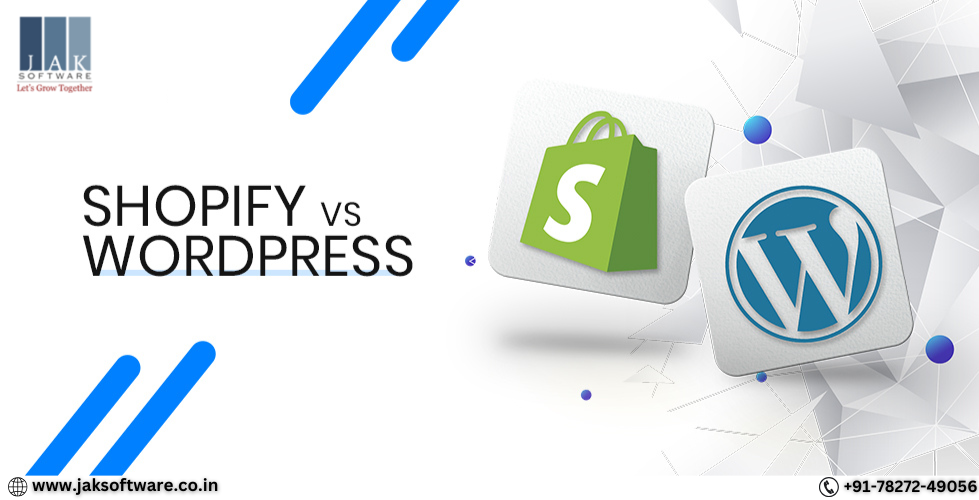When it comes to launching an online store, choosing the right platform can feel like a monumental decision. Shopify and WordPress are two of the most popular platforms for e-commerce, but which one is better for your success? In this guide, we’ll dive deep into the key differences, advantages, and challenges of Shopify and WordPress so you can make an informed decision. To help you navigate this comparison, we’ve broken the article into easy-to-digest sections. Whether you’re a budding entrepreneur, a seasoned professional, or a digital marketing company enthusiast, this guide will help you find the best solution tailored to your needs.
Overview of Shopify and WordPress
Shopify:
Shopify is an all-in-one e-commerce platform that provides everything you need to build, manage, and scale your online store. It is specifically designed for e-commerce, which makes it a popular choice among businesses that want a streamlined solution.
The platform eliminates the need for technical expertise by offering a user-friendly interface and pre-built functionalities. This makes it ideal for beginners who are just starting their e-commerce journey.
Whether you’re launching a small boutique or scaling a large enterprise, Shopify provides the tools to adapt and grow with your business needs.
WordPress:
WordPress is a highly versatile content management system (CMS) that powers more than 40% of websites worldwide. While it is not exclusively an e-commerce platform, it can be transformed into one using the WooCommerce plugin.
WordPress offers unparalleled customization options. You can choose from thousands of themes and plugins to create a unique website tailored to your specific requirements. However, this flexibility comes with a steeper learning curve, as you may need technical skills to make the most of its features.
The platform is ideal for users who want full control over their website’s design and functionality. It’s particularly suitable for businesses with complex or unique needs that can’t be met by out-of-the-box solutions.
Ease of Use
Shopify:
Shopify’s intuitive drag-and-drop interface allows users to easily build and manage their online stores without any coding knowledge. This makes it an excellent choice for beginners who want a hassle-free experience.
The platform offers a variety of pre-designed themes that can be customized to match your brand’s identity. These themes are fully optimized for mobile devices, providing your customers with a smooth and responsive shopping experience.
Shopify simplifies the entire process of running an online store by handling hosting, security, and updates. This allows business owners to focus on growing their brand rather than worrying about technical details.
WordPress:
WordPress provides immense control and flexibility, but it requires a bit more effort to set up and manage compared to Shopify. Users need to purchase hosting, install WordPress, and manage plugins to create a functional e-commerce site.
While the initial setup can be challenging, the platform offers a wide range of tutorials and resources to help users get started. Once you become familiar with WordPress, it becomes a powerful tool for building a unique and professional online store.
For those who are not tech-savvy, hiring a professional developer or working with digital marketing services can make the process much smoother.
Customization Options
Shopify:
Shopify operates as a closed system, which means it has limitations when it comes to customization. However, the platform offers a range of themes and apps in its Shopify App Store, allowing users to enhance their store’s functionality.
While Shopify’s customization options are not as extensive as WordPress, they are sufficient for most small and medium-sized businesses. The platform also supports custom coding for advanced users who want to make specific modifications.
Shopify’s ecosystem of apps covers a wide array of needs, from marketing and SEO to inventory management and customer support. This makes it easier for businesses to add features without the need for extensive development work.
WordPress:
WordPress is renowned for its customization capabilities. With thousands of free and premium themes available, users can create a website that perfectly aligns with their brand identity.
For businesses with unique or complex needs, WordPress allows for custom coding. This level of flexibility is unmatched by Shopify, making it the preferred choice for users who want complete control over their websites.
The platform provides a wide range of plugins that enhance its capabilities. Whether you need advanced SEO tools, payment gateways, or social media services integrations, WordPress has a plugin for almost every requirement.
E-commerce Features
Shopify:
Shopify has all the essential features needed to run an online store. It includes inventory management tools, multiple payment gateway options, and integrated shipping solutions.
The platform also offers advanced features like abandoned cart recovery, which helps businesses boost sales by reminding customers to complete their purchases. This feature is particularly valuable for reducing cart abandonment rates.
Shopify’s focus on e-commerce ensures that its features are tailored to meet the needs of online businesses. From analytics to marketing tools, the platform provides everything required for success.
WordPress:
WordPress depends on plugins such as WooCommerce to incorporate e-commerce features. WooCommerce is a powerful and flexible tool that allows users to create an online store with product catalogs, payment processing, and order management.
While WooCommerce provides a strong foundation for e-commerce, users can further enhance their store with additional plugins. This adaptability makes WordPress a versatile option for businesses with specific requirements.
The platform’s open-source nature means developers can create custom solutions to address unique challenges. This makes WordPress an excellent choice for businesses that need a tailored approach to ecommerce website design
Conclusion
The choice between Shopify vs WordPress depends on your business needs. Shopify offers simplicity, quick setup, and a seamless experience, ideal for small to medium-sized businesses. WordPress, with its flexibility and customization, is better suited for businesses with unique or complex requirements. Evaluate your goals and resources to select the platform that best supports your e-commerce growth and success.




